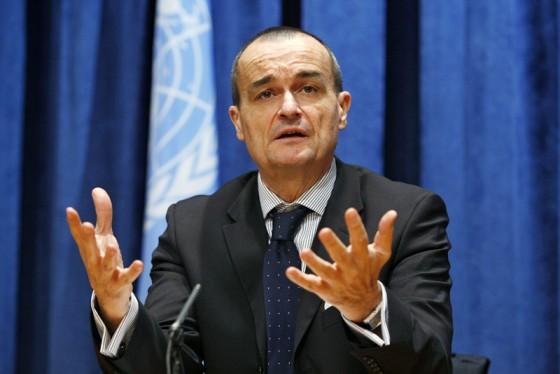The Jan. 31 panel hosted by The Madeleine Korbel Albright Institute for Global Affairs titled “Public Dialogue on Addressing Global Inequality” consisted of many high profile individuals, including former Secretary of State Madeleine Korbel Albright ’59, International Monetary Fund Managing Director Christine Lagarde, World Bank Managing Director Sri Mulyani Indrawati and former United Nations Development Programme Administrator Mark Malloch-Brown. While students were excited about this panel, other events often have low turnout.
“There seems to be always so many things happening that it all gets lost, so I don’t go to many events,” Isabella Holland ’16 said.
Often it is the big name speakers who attract students’ attention.
“I thought [the Albright panel speakers] were really good based on what people are interested in. Having one of the lead speakers be the head of the IMF was pretty cool. I think having really big high profile speakers really got people to go to that,” Emily Park ’17 said.
Political Science Department Chair and Professor William Joseph believes that high profile speakers at Wellesley enhance students’ education.
“One of the advantages of Wellesley being a quite well-off institutions is an ability to sponsor a wide range of events that really enrich the educational experience,” Joseph said.
Joseph also speculated that many of the Albright speakers come to Wellesley by personal connection with Albright.
“I’m sure a lot of those are Secretary Albright’s connections. She’s got a lot of them. They respect her, and they respect Wellesley, and that’s a powerful combination,” Joseph said.
According to Joseph, many lectures the political science department organizes are facilitated through personal or professional connections with the speaker. With preexisting connections, it is easier to contact speakers and organize events with them.
The French House, like the political science department, often brings prominent speakers to Wellesley, such as authors, journalists, scholars and film directors. According to Director of the French House and Senior Lecturer in French Professor Marie-Paule Tranvouez, the French House works not only with professional contacts, but also with the French Consulate to organize lectures.
Tranvouez, like Joseph, has found that Wellesley’s reputation has encouraged prominent speakers to give lectures at Wellesley.
“There’s the prestige of Wellesley, but also they want to share their work in an academic environment,” Tranvouez said.
Both Joseph and Tranvouez believe that budget prevents their respective departments from bringing very many large speakers.
“A few years ago… I got in touch with [a prominent economist] through her website to see if she’d talk at Wellesley,” Joseph said. “Her assistant said her fee is 10,000 dollars, and she has to fly business class, needs a private limo from the airport and they kept adding things on. At most we could get a thousand dollars or so. [Budget] is often a hindrance. It’s often not financially reasonable.”
The French House deals with the limited budget by restricting the number of lectures given each semester.
“Sometimes, in order to bring in one very famous speaker, the French House will invite a few less speakers during the rest of the year,” Tranvouez said.
While certain speakers have exorbitant fees, many public officials, such as French Ambassador to the United States, Gérard Araud who recently spoke at Wellesley on invitation from The Susan and Donald Newhouse Center for the Humanities, are not allowed to accept honorariums for speaking.
Joseph also noted that there is a large budget inequity between departments for bringing speakers.
“It’s often the large departments who have the funds to host lectures,” Joseph said.
All departments receive some funding through the Committee on Lectures and Cultural Events (CLCE) and receive funds for speaker fees through their standard budget.
“A few departments have special endowed funds that were given as gifts to them. Political science is one of those, and economics as well…There’s a bit of inequity there. But if someone gives a gift to a department in a fund you can’t just throw it into a general lectures budget,” Joseph said.
As an art history major, Holland agreed that there is a disparity between departments.
“I always feel like a lot of things are happening in Pendleton. I don’t think the art history department brings as much as other departments,” Holland said.
In addition to budget, departments may limit the number of lectures they host due to fears of low turnout.
“You’ll go to events and there will be 10 people there. And you think of the per capita cost, and it’s pretty costly. Wellesley’s schedule is packed, so it’s always kind of hit or miss. I suppose if you had a really big name that would draw audiences,” Joseph said.
Park agreed that Wellesley events often have low turnout, and suggested that balancing quantity with quality could solve this problem.
“I think maybe you could cut on the quantity of speakers if you could have a gain in how prolific and how well known the speakers are. So instead of 5 lesser known people maybe have one or two huge events kind of like the Albright panel, where a lot of people went because these people were huge,” Park said.
Photo courtesy of France-Amerique







